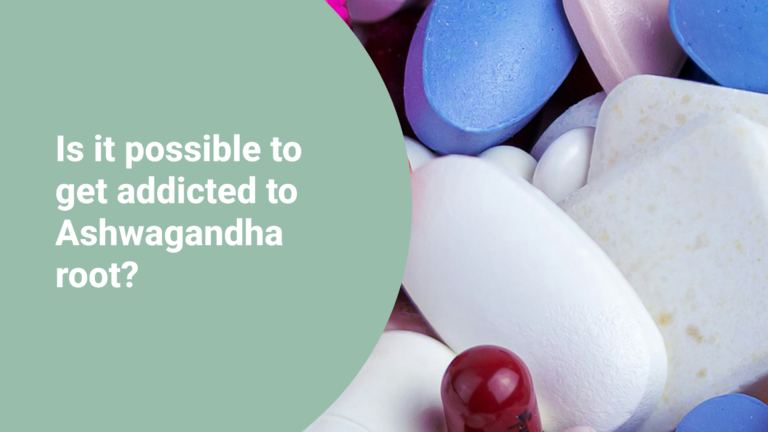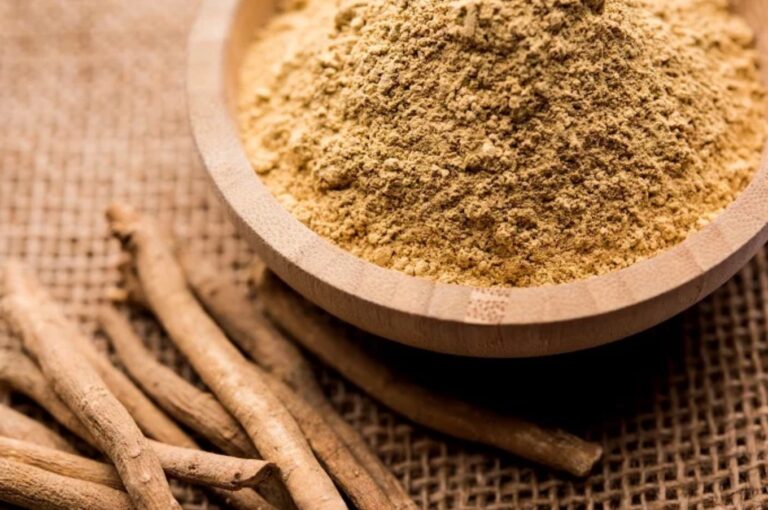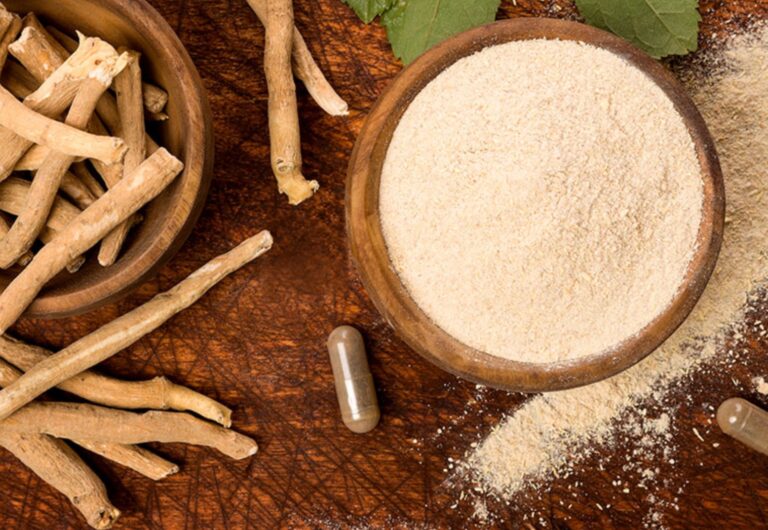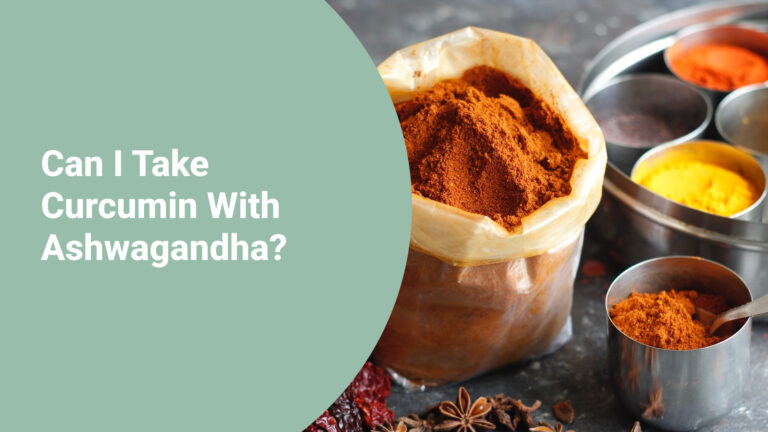GABA vs Ashwagandha: Differences, Dosages, Purposes & Risks
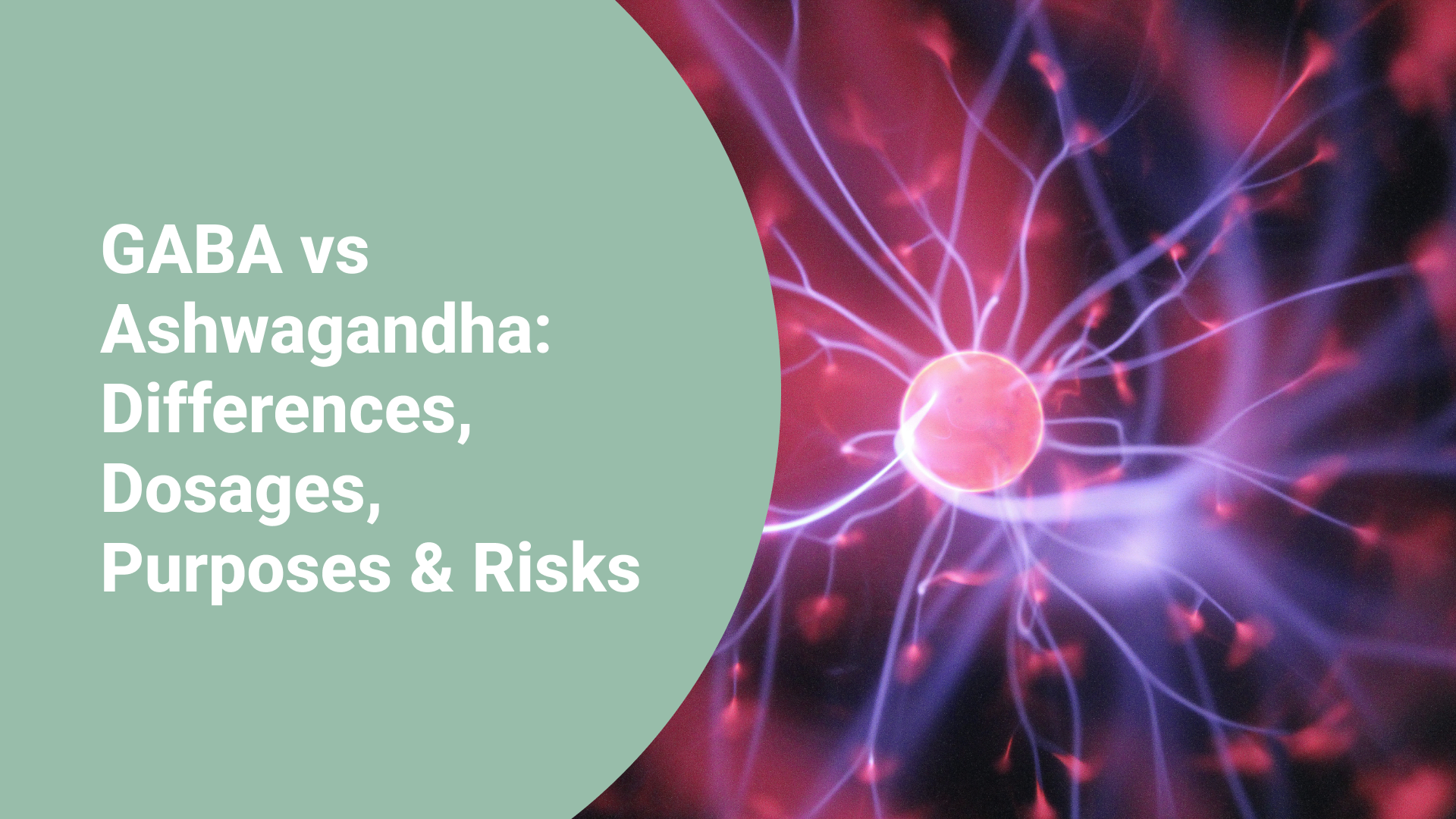
Ashwagandha Expert is a project that offers the most accurate information in an accessible, understandable and applicable way so that readers can make the best...Read more
✅ Evidence-Based
⚙️ Methodology
From the author:
GABA vs Ashwagandha
GABA vs Ashwagandha: General Comparison
| Criteria | GABA | Ashwagandha |
|---|---|---|
| Traditional Uses | Calming, sleep aid | Adaptogen, stress relief, vitality |
| Active Compounds | Amino acid | Withanolides, alkaloids |
| Adaptogenic Properties | Limited | Yes |
| Stress and Anxiety | Calming, anxiety reduction | Stress relief, anxiety reduction |
| Libido and Sexual Health | Limited impact | Improved libido |
| Testosterone Levels | No direct impact | May support testosterone production |
| Cognitive Function | Calming, may improve focus and clarity | Improved cognitive function, memory |
| Anti-Inflammatory | Limited | Anti-inflammatory effects |
| Antioxidant Activity | Limited | Antioxidant properties |
| Safety and Side Effects | Generally considered safe | Generally considered safe |
| Best for: | Anxiety, sleep disorders | Stress, anxiety, vitality |
| Side Effects: | Drowsiness Fatigue | Upset stomach Diarrhea Nausea Vomiting Drowsiness |
| Advantages: | Rapid onset, calming effect | Broad-spectrum adaptogenic benefits |
| Disadvantages: | Short duration of effect | Variable response among individuals |
| Cost Comparison: | Moderate | Moderate |
| Duration of Effect: | Short-lived | Varies, can be longer-lasting |
| Suitability for Long-Term Use: | Limited evidence, caution advised | Generally considered safe for long-term use |
| Minimum Dose: | Varies, typically 250-750mg | Varies, typically 250-600mg (standardized extract) |
| Absorption by the Body: | Rapid and efficient | Variable, may benefit from fat absorption |
| Excretion Time: | Short, typically a few hours | Moderate, several hours |
What is GABA?
GABA (Gamma-aminobutyric acid) is a naturally occurring amino acid functioning as a main inhibitory neurotransmitter in the central nervous system. Its role is to block specific brain signals, reducing nervous system activity. GABA has a calming effect.
When we face stress, our brain triggers the hypothalamic-pituitary-adrenal (HPA) axis, a system that produces cortisol. Short-term cortisol helps us deal with stress, but prolonged activation leads to issues like restlessness, anxiety, insomnia, addiction, headache, depression, and epilepsy.
To manage stress, our brain utilizes GABA, a natural amino acid. GABA acts as a neurotransmitter, slowing down brain stimuli and balancing cortisol levels. It’s crucial during times of anger, stress, and anxiety, as it calms us down and decreases neuron activity in our central nervous system.
Many anxiety medications (e.g., Xanax, Valium) and Adaptogens (e.g., Ashwagandha) increase GABA levels to relieve stress and anxiety symptoms.
Our body uses GABA not only in the brain but also in other organs. When there’s not enough GABA, it can be connected to issues like high blood pressure, diabetes, liver problems, chronic pain, kidney disorders, and allergies.
“A decrease in GABA means that the brain cells can no longer communicate to each other properly,” says A/Prof. Gustin.
Let’s talk about the benefits of GABA
GABA helps regulate mood and ease stress. When stress hits, GABA steps in to calm our nervous system, preventing excessive activity. Its important role goes beyond the brain to benefit the entire body.
Anxiety and stress management
Prolonged stress can lead to increased inflammation and elevated cortisol levels in your body. This may cause:
- Weight gain, especially in the midsection and upper back
- Facial rounding and increased body weight
- Acne
- Thinning skin
- Easy bruising
- Flushed face
- Slower healing
- Muscle weakness
- Intense fatigue
- Irritability
- Difficulty concentrating
- High blood pressure
- Headaches
GABA is a key brain neurotransmitter that brings a calming effect, reducing stress by regulating serotonin and dopamine. This biochemical process helps ease feelings of stress, unhappiness, anxiety, and depression.
Recent studies show positive outcomes with GABA supplements for stress reduction. However, more research is needed to confirm GABA as a definite stress-relief solution.
In a 2006 article, small studies revealed that those using GABA supplements felt more relaxed during stress compared to those on a placebo or L-theanine, another popular supplement.
In a recent study researchers found that GABA Oolong tea increases RR interval in both low and high-stress groups. Specifically, GABA Oolong has a stronger effect on heart rate variability (HRV) in highly stressed individuals. However, there were no significant impacts on other HRV parameters or subjective stress.
The RR interval is the duration between two successive R waves in an electrocardiogram, reflecting the time taken for one complete heartbeat and serving as a key measure for heart rate variability.
In another study participants reported improved calmness and worry scores after 4 weeks of consuming GABA rice (16.8 mg GABA/150 g rice). Yet, these positive effects weren’t sustained. While there were hints of potential benefits, like reduced blood cortisol and increased adiponectin levels in the GABA rice group at the 8th week, no effects on adrenocorticotropic hormone (ACTH) were observed.
Provide better sleep quality
Research indicates that GABA supplements not only soothe our minds but also enhance the quality of sleep and alleviate insomnia.
In a 2018 study, participants who consumed 300 mg of GABA one hour before bedtime experienced quicker sleep onset compared to those who took a placebo. Furthermore, after four weeks of treatment, they reported an improvement in sleep quality.
A Japanese study revealed that individuals taking GABA supplements achieved a 5.3-minute reduction in average time to fall asleep and a notable 7.3% increase in deep sleep.
Modern sleep medications, like Ambien and Lunesta, use compounds such as Zolpidem and Eszopiclone to enhance the body’s GABA system and induce sleep.
Manage high blood pressure
GABA has been proven to effectively lower high blood pressure. In a 2003 study, those with mild high blood pressure who consumed GABA-rich fermented milk saw a significant reduction in blood pressure in just two to four weeks, surpassing the results of the placebo group.
A 2009 study discovered that taking a GABA-containing Chlorella supplement twice daily lowered blood pressure for individuals with borderline hypertension.
A Japanese study showed that daily consumption of GABA-rich white rice for eight weeks led to a notable decrease in blood pressure for adults with mildly elevated levels.
Researchers affirm that GABA is a potent ally in reducing blood pressure, suggesting that regular consumption could potentially delay or prevent the early onset of blood pressure-related conditions.
GABA has anti-cancer properties
GABA, a substance naturally present in the body, shows potential against cancer.
GABA impacts cell growth through GABAAR and cell invasion through GABABR. Yet, it’s uncertain if GABA signaling positively or negatively influences cancer cell behavior.
Scientific studies indicate that GABA can inhibit the growth of cancer cells. Researchers have observed that GABA influences certain receptors in the body, hindering the progression of tumors. This suggests that GABA could be explored as a tool in the fight against cancer.
Strengthens the immune system
GABA appears to positively impact the immune system. Immune cells (such as dendritic cells and macrophages) produce and release GABA, potentially influencing local immune responses. GABA receptors in immune cells suggest a role in controlling immune cell activity.
GABA may prove effective for individuals with autoimmune disorders like Multiple Sclerosis (MS). Scientifically, there’s an indication that increasing GABA production could be a potential treatment for these conditions.
The GABA breakdown system in immune cells, involving GABA transporters (GATs) and GABA transaminase (GABAT), likely has a positive impact. This system helps maintain balanced GABA levels within the immune system. The discovery of GAT-2 in immune cells adds to the positive understanding of how GABA influences immune function.
In summary, studies show that GABA has a beneficial effect on the immune system. This opens possibilities for exploring how GABA may support immune function and interventions to improve the overall immune response.
Research on the effects of GABA levels on the immune system is limited.
Reduces chronic pain
GABA is known for its calming effects, but it also shows promise in addressing inflammation issues. It may offer benefits for those dealing with chronic pain, such as individuals with PMS.
In addition, the chronic pain that GABA deficiency can cause is an undeniable fact.
“We have discovered, for the first time, that ongoing pain is associated with a decrease in GABA, an inhibitive neurotransmitter in the medial prefrontal cortex. In other words, there’s an actual pathological change going on.”
Associate Professor Sylvia Gustin, a neuroscientist and psychologist at UNSW and NeuRA
The dysregulation of GABA and glutamate metabolites is believed to contribute to chronic pain in adults. GABA supplements could potentially play a role in preventing or treating chronic pain effectively.
Currently, there’s a focus on developing and utilizing analgesic drugs that target GABA-related enzymes, receptors, and transporters to address pain-related concerns.
Lower obesity risk
Obesity poses a major health risk globally, leading to issues like high blood pressure, type 2 diabetes, heart problems, stroke, and osteoarthritis.
Research indicates that GABA can help prevent obesity. In an eight-week study, participants who took GABA saw a drop in body fat and triglyceride levels, along with an increase in lean muscle mass, even without exercise.
GABA-T degradation, as per studies, lowers fat mass by curbing food intake without impacting energy expenditure in individuals dealing with obesity.
A recent study in Nature revealed that specific neurons, named GABRA5LHA, located in the lateral hypothalamic area (LHA) of the brain, play a crucial role in regulating body fat. Activation of these neurons decreases fat buildup, lowering the risk of obesity. The study also proposes that inhibiting a substance released by supporting cells (astrocytes) near these neurons may offer a promising avenue for obesity treatment.
Gabra5LHA are a distinct subpopulation of GABAergic neurons and show decreased pacemaker firing in diet-induced obesity (DIO) mouse model.
It is good for schizophrenia, autism spectrum disorder and major depression
GABA, a key factor in normal cognitive functions, may face deficiency or irregular activity, impacting one’s cognitive abilities.
Autism spectrum disorder, major depressive disorder, and schizophrenia have been linked to GABA irregularities, shedding light on the close relationship between these disorders.
Abnormal GABA functioning has been underscored as a potential contributor to suicide, particularly within the context of major depressive disorder.
Exploring autism spectrum disorder through animal and human studies, researchers have discovered connections between GABA activity abnormalities and the manifestation of ASD symptoms. A correlation has been observed between GABA and individuals with autism who display limited interests or struggle with social interaction.
The current understanding of GABA’s relevance to these conditions is constrained by limited research.
About GABA side effects
GABA offers health benefits for the brain and overall well-being. However, it’s essential to be aware of potential drawbacks. Research indicates that a 120 mg GABA supplement over 12 weeks is unlikely to lead to adverse effects.
Caution is advised when using GABA supplements, as they may pose risks:
- Combining GABA with alcohol, opioids, or tranquilizers can slow down the body and cause breathing difficulties.
- GABA may interact with other medications, leading to undesired side effects.
- When taken alongside high blood pressure and epilepsy drugs, it can enhance the effects of these medications.
- Some users may experience a slight burning sensation in the throat or tingling in the skin.
- There could be a moderate drop in blood pressure.
Common effects of Ashwagandha and GABA
Many natural herbs can replace GABA, which can cross the blood-brain barrier and act directly on GABA, subsequently creating a state of relaxation. One of these is Ashwagandha.
Ashwagandha, a natural herb and adaptogen, helps calm the mind by activating GABAergic signaling, leading to stress reduction and improved sleep. It achieves this by slowing down cortisol production, calming neuron firing, and decreasing overall neuron activity.
While Ashwagandha and GABA share similar principles, it’s important to note their distinctions. Before touching on their differences, it is important to highlight their similarities.
First, let’s talk about what they both do:
- Stress reduction
- Cognitive support
- Energy and vitality
- Anti-depression/healing
- Improves sleep quality
- Prevents obesity, helps lose weight
- Increases energy level
- Strengthens the body’s immune system with anti-inflammatory properties, preventing autoimmune diseases.
Both Ashwagandha and GABA have scientific backing for their positive effects. When you use these supplements, you can expect common, scientifically proven benefits.
[READ: Health Benefits of Ashwagandha]
Differences Between Ashwagandha and GABA
Ashwagandha and GABA are quite distinct due to their diverse origins. GABA, an amino acid and neurotransmitter, is naturally formed in the brain. On the other hand, Ashwagandha is derived from a plant. Despite this contrast, the rise of GABA supplements has led to comparisons between Ashwagandha and GABA.
Functional differences
Ashwagandha regulates serotonin and lowers cortisol by interacting with GABA receptors. This helps the body adapt to stress by slowing down the brain’s stress response.
On the other hand, GABA, a key neurotransmitter, regulates nerve activity in the brain. Low GABA levels may lead to issues like depression, sleep problems, anger, and stress. GABA supplements, binding to receptors, calm the nervous system, offering relief from these problems.
GABA supplements, like Ashwagandha, help lower corticoliberin secretion. This prevents excessive cortisol release in stressful situations, effectively managing anxiety, stress, and fear.
Ashwagandha is a testosterone booster
Ashwagandha offers various benefits, such as reducing stress and anxiety, promoting better sleep, and enhancing overall health. Moreover, it’s shown to positively impact testosterone levels in men.
In one study, men using Ashwagandha root extract demonstrated testosterone levels five times higher than those in the placebo group.
Examining 75 fertile men tested for infertility, another study observed that those taking Ashwagandha experienced increased testosterone production and luteinizing hormone (LH) levels.
Beyond elevating testosterone, Ashwagandha plays a role in combating male infertility. Research indicates that it improves sperm count, motility, and quality in men facing infertility challenges.
In a separate study involving infertile men, researchers explored the effects of Withania somnifera supplementation on stress-related reproductive issues. The results not only showed enhanced semen quality but also reduced stress levels. Remarkably, by the study’s end, 14% of the men’s partners had successfully conceived.
In a recent study on men aged 40 to 70, using ashwagandha extract increased their testosterone levels by 15% and DHEA levels by 18%.
In a study, it was found that the neurotransmitter GABA could impact testosterone levels by interacting with Leydig cells in the testes. These cells, equipped to respond to GABA, may influence their functions, including the production of testosterone. However, it’s crucial to highlight that this connection is based on findings from a single study.
Ashwagandha boosts testosterone, but there’s limited scientific research on how GABA affects testosterone levels.
Form of supplement
GABA and Ashwagandha supplements come in different forms.
Ashwagandha is available in powder, liquid extracts, capsules, teas, leaves, and roots.
GABA supplements are only in capsule form. The effectiveness of GABA capsules in crossing the blood-brain barrier is still debated.
Ashwagandha easily crosses the blood-brain barrier. Water-soluble Ashwagandha compounds leave the body within 2-3 days, while fat-soluble ones take up to a month to be excreted.
Safety and interactions
Ashwagandha is generally safe for short- and medium-term use. However, it may not be suitable for:
- Individuals with thyroid disease
- Those who are pregnant, planning pregnancy, or breastfeeding
- People with heart disease
- Risk of interactions with other medications
- Individuals using sedatives or antidepressants
- Those who consume alcohol
GABA supplements have gained popularity lately. Research is ongoing to determine their safety and effectiveness. Like Ashwagandha, there are situations where GABA use is not recommended:
- Incompatibility with blood pressure and anti-seizure medications
- Not advised for individuals who consume alcohol
- Incompatible with sedatives or antidepressants
The U.S. Food and Drug Administration (FDA) does regulate dietary supplements, treating them like foods rather than medications. Unlike drug manufacturers, supplement makers are not obligated to prove the safety or efficacy of their products before selling them.
Dosages, side effects and usage
There isn’t clear evidence about the ideal amount of Ashwagandha to use. While 250-500 mg is often considered a minimal amount, some people may face side effects even with less.
For Ashwagandha use, consider the following doses:
- Standard ground Ashwagandha powder: 3 to 6 grams daily
- Arthritis: 250 to 500 mg of extract (4-5% withanolides)
- Antioxidant protection: 100 to 200 mg of extract (4-5% withanolides)
- Immunity: 100 to 200 mg of extract (4-5% withanolides)
- Relaxation: 250 to 500 mg of extract (4-5% withanolides)
- Stress: 250 to 500 mg of extract (4-5% withanolides)
- Sexual performance: 250 to 500 mg of extract (4-5% withanolides)
If you’re thinking about trying Ashwagandha, start with 50-100mg and adjust based on how it affects you.
For those using Ashwagandha and noticing side effects after a few weeks, it’s not advisable to abruptly stop. This can worsen side effects. Instead, reduce the dose gradually and discontinue use.
Common side effects of Ashwagandha:
- Upset stomach
- Diarrhea
- Nausea
- Vomiting
- Drowsiness
Use of Ashwagandha for more than 2 months is not recommended.
GABA appears generally safe in regular food amounts and as a medicine in larger doses, with usage of up to 1.5 grams per day for a month considered safe.
However, we lack enough reliable information to determine if GABA supplements remain safe for periods longer than a month.
According to the NNHPD monograph for Cognitive Function Products, a daily GABA intake of 50-3000 mg is recommended, not exceeding 750 mg per single dose. The guidance suggests consulting a healthcare practitioner if using GABA for over 4 weeks, especially products providing 300 mg/day or more.
High-dose GABA supplements may lead to:
- A mild burning sensation in the throat
- Occasional, brief episodes of shortness of breath
- Moderate reduction in blood pressure
- Tingling sensation in the skin
- Feelings of drowsiness
For personalized advice and to find the right dosage, consult with your doctor.
Experiencing withdrawal from Ashwagandha and GABA, which starts within 7 to 12 days of stopping usage, may include:
- Dizziness
- Tiredness
- Anxiety
- Nausea
- Insomnia
Ashwagandha vs GABA: which is best for you?
Choose between Ashwagandha and GABA based on your specific reasons for use.
Consider Ashwagandha for:
- Enhanced overall health
- Strengthened immune system
- Improved sleep quality
- Reduced stress, anxiety, and depression
Consider GABA for:
- Short-term stress relief
- Balanced blood pressure
- Diabetes management
Ashwagandha might not suit everyone. Whether it’s in powder, root, capsule, spice, or tea form, the strong smell could be off-putting for those sensitive to scents.
Adjusting to Ashwagandha may take time. Some people face issues like nausea, headaches, and vomiting in the initial weeks, possibly due to a dosage that’s too high or sensitivity to the herb’s taste and smell.
In contrast, GABA is more user-friendly, with a milder scent and easier usage.
However, Ashwagandha is more reliable and known in terms of its benefits and properties supported by scientific studies.
So, in this comparison, my vote goes to Ashwagandha.
My Pick

Double Wood Supplements Ashwagandha 500mg
I picked Double Woods Supplements for my Ashwagandha, and it turned out good. The product doesn’t have a bad smell. It worked well for me. If you’re new to Ashwagandha, go for the 500 mg one from Double Products Supplements. It’s a good choice.
Small note: If you purchase the product through the button below, I may earn a small commission and continue this project.
Can you use Ashwagandha and GABA together?
Avoid combining Ashwagandha and GABA, as it can heighten their impact and lead to more side effects.
Using GABA and Ashwagandha together can better handle cortisol levels, easing stress and aiding in blood pressure and weight management. Despite potential benefits, it’s not advisable to use both simultaneously due to possible risks.
Furthermore, refrain from using these supplements if you have diabetes, high blood pressure, thyroid issues, take immune system-reducing drugs, tranquilizers, antidepressants, or anti-seizure medications.
Ashwagandha Expert is a project that offers the most accurate information in an accessible, understandable and applicable way so that readers can make the best possible decisions about the Ashwagandha plant and its use.
More Posts
